精品牛津7AU2语法 行为动词的一般现在时讲解及练习(含答案)
精品牛津7AU2知识点总结和练习(含答案).doc
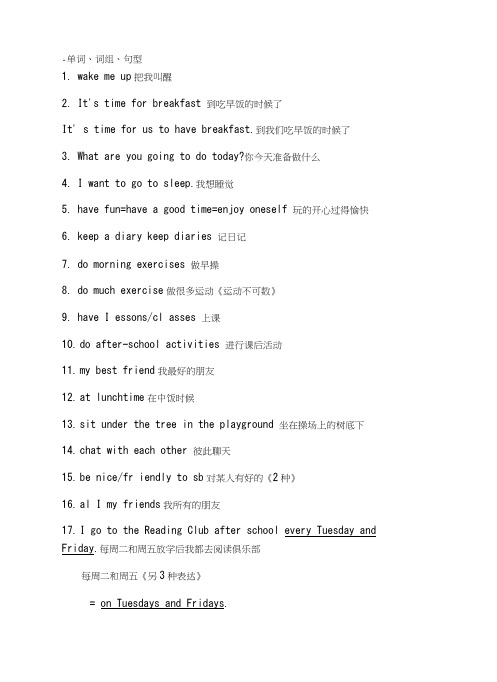
-单词、词组、句型1.wake me up把我叫醒2.It's time for breakfast 到吃早饭的时候了It' s time for us to have breakfast.到我们吃早饭的时候了3.What are you going to do today?你今天准备做什么4.I want to go to sleep.我想睡觉5.have fun=have a good time=enjoy oneself 玩的开心过得愉快6.keep a diary keep diaries 记日记7.do morning exercises 做早操8.do much exercise做很多运动《运动不可数》9.have I essons/cl asses 上课10.do after-school activities 进行课后活动11.my best friend我最好的朋友12.at lunchtime在中饭时候13.sit under the tree in the playground 坐在操场上的树底下14.chat with each other 彼此聊天15.be nice/fr iendly to sb对某人有好的《2种》16.al I my friends我所有的朋友17.I go to the Reading Club after school every Tuesday and Friday.每周二和周五放学后我都去阅读俱乐部每周二和周五《另3种表达》= on Tuesdays and Fridays.=twice a week.=two days a week.(用什么提问》how often19. 我最喜欢的课是语文和英语My favourite lessons are Chinese and English・=I I ike Chinese and English best・20.I spend about two hours a day doing my homework・我一天花大约2小时做我的家庭作业21.I also I ike playing vol leybal I・我也喜欢打排球(2 种》=I I ike playing volleyball, too.22.Amy is a very good swimmer・ Amy 擅长游泳《5 种》= Amy is good/clever at swimming・=Amy does we I I in swimming.=Amy swims we I I・23.practise doing sth with sth 和某人练习做某事24.Amy是游泳俱乐部一员《2种》Amy is a member of the Swimming Club・=Amy is in the Swimming Club.25.e-ma i I me =wr ite/send an emai I to me 写/发邮件给我(3 种》26.I i sten to the radio/her听收音机/听她的(宾格》27.read newspapers 看报纸28.Peter and I both love footbaI I 彼得和我都喜欢足球29.My parents are both doctors.我的父母都是医生30.We play t ogether all the time 我们一直一起玩31.make model planes制作飞机模型32.watch footbaI I matches on TV在电视上看足球比赛33.watch too much TV 看太多电视对too much 提问用(how much)34.be busy (in) doing homework 忙于做作业35.be busy with homework 忙于作业36.know about the匹些(不可数)了解这个新闻37.know a lot about computers 对电脑了解很多38・meet up with sb约见某人去上她的舞蹈课40.teach us English 教我们英语39.go to her dancing lesson41.She does not have much time to talk with her friends.她没有很多时间和她的朋友聊天42. get some informal ion (不可数)about…得到一些关于的信息43.say hello to her《宾格》向她问好44.go on a school trip = have a school trip 进行一次学校旅行45.next Monday 下周一46.Each (=every) student can spend ¥ 10.每个学生可以花10 元47・ Thank you for organizing the class trip.谢谢你组织这次班级旅行48.wouId I ike to do sth=want to do sth 想要做某事《2 种〉49.The price for each student is ¥5. 每个学生的票价是5 元50.The price is too high. (low).价格太高或太低51.The t icket i s expens ive/cheap.票太贵或便宜52.票价格是多少(2种)What, s the price of the ticket?How much is the ticket?53.The zoo is open from 7:30a. m. to 5:00p. m.动物园从早上7点到下午5点开放—54.The shop is closed on Mondays 商店周一关门55.We are al I Iooking forward to a great day out! (look forward to+ doing/n・)我们都期盼出去好好玩一天生你认为你的新学校如何《2种》What do you think of your new school?二How do you Ii ke your new schooI?57.不要担心。
行为动词的一般现在时语法及相应练习(精编文档).doc
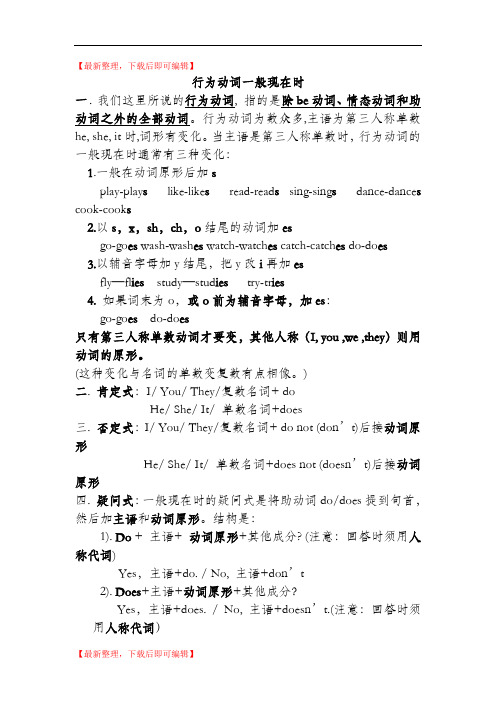
【最新整理,下载后即可编辑】行为动词一般现在时一.我们这里所说的行为动词, 指的是除be动词、情态动词和助动词之外的全部动词。
行为动词为数众多,主语为第三人称单数he, she, it时,词形有变化。
当主语是第三人称单数时,行为动词的一般现在时通常有三种变化:1.一般在动词原形后加splay-play s like-like s read-read s sing-sing s dance-dance s cook-cook s2.以s,x,sh,ch,o结尾的动词加esgo-go es wash-wash es watch-watch es catch-catch es do-do es3.以辅音字母加y结尾,把y改i再加esfly—fl ies study—stud ies try-tr ies4.如果词末为o,或o前为辅音字母,加es:go-go es do-do es只有第三人称单数动词才要变,其他人称(I, you ,we ,they)则用动词的原形。
(这种变化与名词的单数变复数有点相像。
)二. 肯定式:I/ You/ They/复数名词+ doHe/ She/ It/ 单数名词+does三. 否定式:I/ You/ They/复数名词+ do not (don’t)后接动词原形He/ She/ It/ 单数名词+does not (doesn’t)后接动词原形四. 疑问式:一般现在时的疑问式是将助动词do/does提到句首,然后加主语和动词原形。
结构是:1). Do + 主语+ 动词原形+其他成分? (注意:回答时须用人称代词)Yes,主语+do. / No, 主语+don’t2). Does+主语+动词原形+其他成分?Yes,主语+does. / No, 主语+doesn’t.(注意:回答时须用人称代词)五. 那么,什么情况下用行为动词的一般现在时呢?当这个动作经常发生或表示习惯性的动作时,通常用一般现在时,它经常与表示频度的时间状语连用,如,当句子中有every day every year ,on Sunday, in the morning ,often, sometimes, usually, at one o’clock等词时,用一般现在时。
Unit 2 重要语法精讲 (行为动词的一般现在时) 七年级上册英语单元核心知识(牛津译林版)

04
行为动词的一般现在时 句型变化
04
行为动词的一般现在时
句型变化
当主语非三单时,添加助动词do;
否定句:do not/don’t +动词原形 疑问句:do置于主语前,行为动词用原形
肯定句:The twins want to be a doctor. 否定句:The twins don’t want to be a doctor. 一般疑问句:Do the twins want to be a doctor?
3. Lilyy aannddLLinidnadagodsohno’ptpginog sohnoSpupnidnagy.o(n改S成u否nd定a句y.)
05 随堂练习
04 随堂练习
填写动词的适当形式(带*为易错题)
1. Peter __l_o_o_k_s (look) very sad. How __is___ (be) he? 2*. Who _h_e_l_p_s_ (help) wyohua,t和Towmh?o作主语,看作三单 3. Some students in our class ___d_o__ (do) well in Math. 4. He usually w__a_lk_s__(walk) to school. 5*. Everyone of us _w_a_n_t_s__ (want) to win.
day twice a month
Tim goes skating four time a month. They play volleyball once a week. She travels to Beijing once a year.
once 一次 twice 两次 数字+times ...次
Unit 2 行为动词的一般现在时2022-2023学年牛津译林版七年级英语上册同步练习
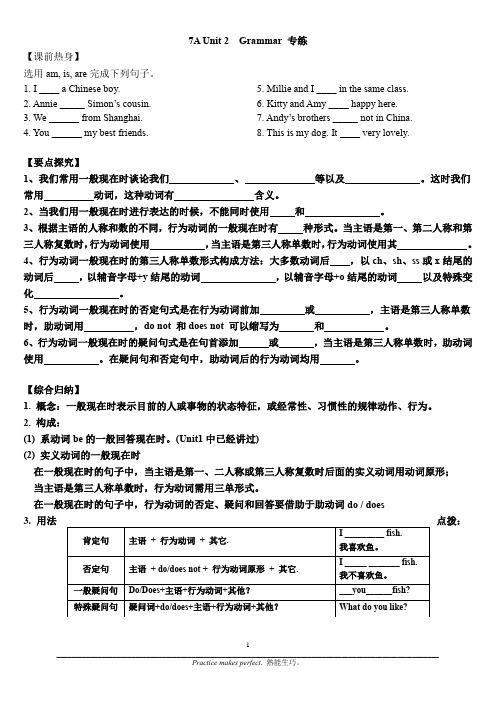
7A Unit 2 Grammar 专练【课前热身】选用am, is, are完成下列句子。
1. I ____ a Chinese boy.2. Annie _____ Simon’s cousin.3. We ______ from Shanghai.4. You ______ my best friends.5. Millie and I ____ in the same class.6. Kitty and Amy ____ happy here.7. Andy’s brothers _____ not in China.8. This is my dog. It ____ very lovely.【要点探究】1、我们常用一般现在时谈论我们、等以及。
这时我们常用动词,这种动词有含义。
2、当我们用一般现在时进行表达的时候,不能同时使用和。
3、根据主语的人称和数的不同,行为动词的一般现在时有种形式。
当主语是第一、第二人称和第三人称复数时,行为动词使用,当主语是第三人称单数时,行为动词使用其。
4、行为动词一般现在时的第三人称单数形式构成方法:大多数动词后,以ch、sh、ss或x结尾的动词后,以辅音字母+y结尾的动词,以辅音字母+o结尾的动词以及特殊变化。
5、行为动词一般现在时的否定句式是在行为动词前加或,主语是第三人称单数时,助动词用,do not 和does not 可以缩写为和。
6、行为动词一般现在时的疑问句式是在句首添加或,当主语是第三人称单数时,助动词使用。
在疑问句和否定句中,助动词后的行为动词均用。
【综合归纳】1. 概念:一般现在时表示目前的人或事物的状态特征,或经常性、习惯性的规律动作、行为。
2. 构成:(1) 系动词be的一般回答现在时。
(Unit1中已经讲过)(2) 实义动词的一般现在时在一般现在时的句子中,当主语是第一、二人称或第三人称复数时后面的实义动词用动词原形;当主语是第三人称单数时,行为动词需用三单形式。
【精品】上海牛津版七年级上册unit2语法
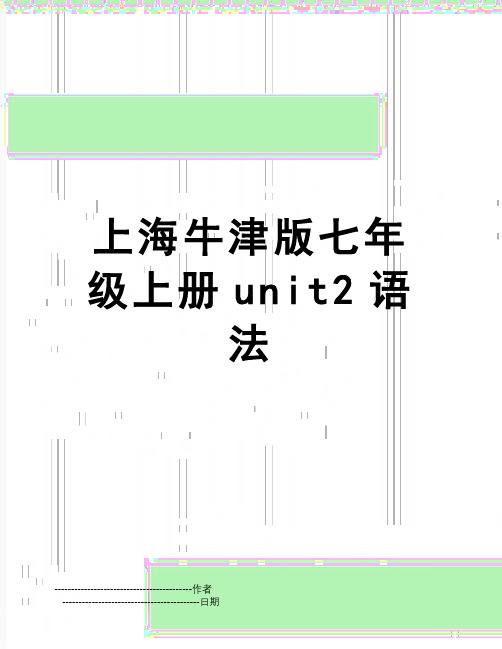
上海牛津版七年级上册unit2语法------------------------------------------作者------------------------------------------日期上海牛津版七年级上册unit2语法:一般现在时一、知识点一般现在时:表示现在的状态、经常的或习惯性的动作、表示主语具备的性格和能力等。
与一般现在时连用的时间状语:often, always, sometimes,usually, every day/ week/ year 等。
一般现在时的构成:(be动词型)肯定句:主语+am/is/are+其它成分(名词、形容词、介词短语)He is an engineer.否定句:主语+am/is/are not+其它成分They are not in the library.一般疑问句:Am/ Is /Are+主语+其它成分?Is it a tall tree? Yes, it is. / No, it isn’t.主语为第三人称单数特殊疑问句:疑问词+is/am/are +主语+(其它成分)?What time is it now?Where are they?练习:1、She______ a doctor.否定:一般疑问句:肯定回答:否定回答:2、They are lazy boys.否定:一般疑问句:肯定回答:否定回答:一般现在时的构成:(实义动词型)肯定句:主语(除第三人称单数)+动词原形+其它成分I get up at six every day .主语(第三人称单数)+动词s/es +其它成分My father usually goes to work by bus.否定句:主语(除第三人称单数) +don’t+动词原形+其它成分I don’t like swimming.主语(第三人称单数)+doesn’t+动词原形+其它成分The old man doesn’t like playing cards .一般疑问句:Do +主语(除第三人称单数) +动词原形+其它成分?Do the boys often go swimming in summer?Yes, they do. / No, they don’t.主语为第三人称单数Does+主语+动词原形+其它成分?Does she brush her teeth every day?Yes, she does. / No, she doesn’t.特殊疑问句:疑问词+do +主语+动词原形+(其它成分)?When do you usually go to bed?主语为第三人称单数疑问词+does+主语 +动词原形+(其它成分)?What does Jim do after school?主语是第三人称单数时,行为动词的变化规则如下:1、一般动词在词尾加-s,如: helps, makes, gets, swims,knows, plays等2、以s, x,ch,sh 或o结尾的动词在词尾加-es,如dresses,washes,catches,does等3、以辅音字母+y结尾的动词,先变y为i,再加-es,如fly---flies,study--- studies等play-plays enjoy-enjoys写出下列动词的第三人称单数形式:play- fly- pass- do-go- have- study- discuss-wash- work- enjoy- watch-stop-练习:1、I ______(get)up at 6:35 in the morning.否定句:一般疑问句:肯定回答:否定回答:2、They _____(play) football in the playground.否定句:一般疑问句:肯定回答:否定回答:3、She ________(water) the flowers.否定句:一般疑问句:肯定回答:否定回答:4、I usually play football on Friday afternoon.否定句:一般疑问句:5、Su Yang usually washes her clothes on Saturday.否定句:一般疑问句:6、Tom does his homework at home.否定句:一般疑问句:二、按要求改写句子:1. Do you often play football after school? (肯定回答)2. I watch TV at night. (改为否定句)3. She lives in a small town. (改为一般疑问句)4.Nancy doesn’t run fast. (肯定句)5. Does Mary live far away from the school? (否定回答)6 We are middle school students.(改为否定句)7 Mary is ill in hospital.(改为一般疑问句,并否定回答)8 John gets up early every day.(改为否定句)三、单选题:( )1. I ________to school at 7:00 in the morning.A. goB. goingC. goes( )2. They _______books every day in the library.A.readsB. readC. reading( )3. The monkey________ eating bananas very much.A.likeB. likesC. liking( )4. My father ________to read newspaper after supper every day.A.likeB. likesC. liking( )5. I like watching TV, but my mother _________like it.A. don’tB. doesn’tC. does( )6. ____________ your father drink milk every day?A.doB. areC. does()Jenny ____ in an office. Her parents ____in a hospital.A work worksB works workC work are workingD is working work () One of the boys_____ a black hat.A haveB there isC there areD has() We will go shopping if it____ tomorrow.A don't rain Bdidn't rain Cdoesn't rain Disn't rain() He said the sun ____in the east and ____in the west.A rose; setB rises; setsC rises, setD rise; sets()Wang Mei ____ music and often ____ to music.A like; listenB likes; listensC like; are listeningD liking ; listen () Jenny____ English every evening.A has studyB studiesC studyD studied四、用所给动词一般现在时态填空:1. Jim usually ________ (have) lunch at home.2. Li Guanhua _______ (be) twenty years old.3. How many students ________ (be) there in your class?4. ---______ she _______ (study) hard?---Yes, she _________.5 They ____(be) very clever.6 ______ (be) he a doctor or a teacher?7. Lucy and lily _____________ (not speak) Chinese.8. My father ______________ (not do) morningexercises every day.9. She always ___________ (wash) her clothes onSundays.10. ______ your brother ________ (like) playing football?No, he ____________.11. ______ you________(read) English every day?12. How many lessons______ you_______(have) on Monday?13. We sometimes______(go) to school by metro.14. She never _______(fail) an exam.15 He ______________(not have) breakfast at home.一、写出下列动词的单三形式:(一)1.go__________2. catch _________3. brush_________4. wash___________5. do________6. like________7. have___________8. watch ___________9. drink ___________ 10.fly___________ 11.say___________ 12.learn ___________ 13.eat___________ 14.read___________ 15.sing___________ brush________(二)study_______ stay _____ make ___look ____ pass____ carry ____ come_______ watch_____ plant______ teach_______二、把下列句子变成一般疑问句(并作肯定和否定回答)、否定句1.My friends like playing soccer.一般疑问句:肯定回答:否定回答:否定句:2.Lily and Lucy read comic books every day.一般疑问句:肯定回答:否定回答:否定句:3.My aunt likes to go fishing.一般疑问句:肯定回答:否定回答:否定句:4.They speak English every day.一般疑问句:肯定回答:否定回答:否定句:5.Daniel watches TV every evening一般疑问句:肯定回答:否定回答:否定句:6.She is always a good student.一般疑问句:肯定回答:否定回答:否定句:7.They are good students.一般疑问句:肯定回答:否定回答:否定句:三、用括号内动词的适当形式填空。
牛津译林英语 7AUnit 2单元知识点归纳及练习题(含答案)

7A unit 2 单元知识点归纳一、词汇知识点整理1. play sports 做运动2. many times a day 一天许多次(once一次,twice两次)3. play football/tennis 踢足球/打网球4. talk about\of 谈论5. after school 放学后after class 课后6. go swimming 去游泳7. a member of ...中的一员He is a member of Huanghe Football Club8. come from 来自=be from9. listen to music 听音乐Lily likes listening to music10. in the next World Cup 在下届世界杯11. come true 实现I hope his dream comes true12. in one’s free time 在某人的空闲时间13. live in 住/生活在14. read books 看书15. at/ on weekends=at/on the weekend在周末16. stay at home 待在家里17. a lot of 许多= lots of (修饰可数\不可数名词)18. ask sb about sth 问某人某事ask sb to do sth 让某人做某事19. on TV 在电视上20. watch basketball matches 看篮球比赛21. feel great 感觉特棒(系动词+形容词)22. play with sb 和某人一起玩二、句式用法1. I like walking. 我喜欢散步。
2. I walk to my bowl many times a day. 我一天走到我的碗边许多次。
3. I enjoy swimming. What’s your favourite sport? 我喜欢游泳,他最喜欢的运动是什么?Which sport do you like best? 你最喜欢的运动是什么?4.He also enjoys listening to music. 他也喜爱听音乐5.It makes him happy. 这使他高兴\开心6. I hope his dream comes true. 我希望他梦想成真。
牛津版初中时态语态练习一般现在时一般过去时一般将来时现在进行时混合练习附答案修订稿
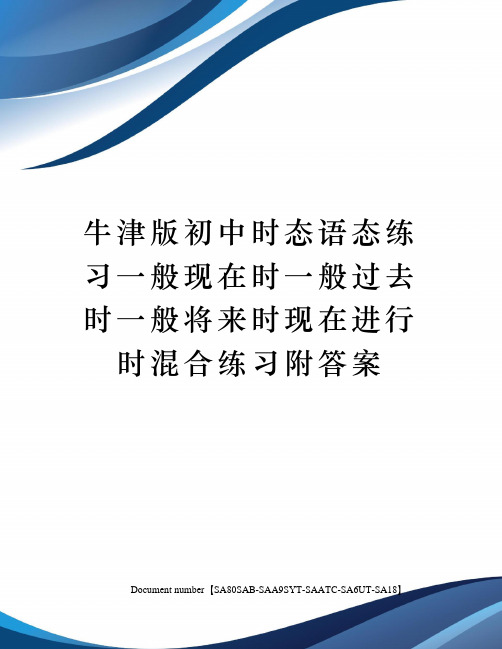
牛津版初中时态语态练习一般现在时一般过去时一般将来时现在进行时混合练习附答案 Document number【SA80SAB-SAA9SYT-SAATC-SA6UT-SA18】一、根据要求改写下列句子。
1.This is my pencil. (变为一般疑问句)Is this your pencil?2.She is going on a trip to Beijing now. (用I做主语改写句子)I am going on a trip to Beijing now.3.He found some meat in the fridge. (改为一般疑问句)Did he find any meat in the fridge4.It is going to be a fine day tomorrow. (改为否定句)It isn’t going to be a fine day tomorrow.5.I stay at home on Saturdays. (对划线部分提问)What do you do on Saturdays?6.That bird is red. (对划线部分提问)What color is that bird?7.They are having lunch at school at the moment. (对划线部分提问)What are they doing at school at the moment?8.Lucy doesn't have sports every day. (变为肯定句)Lucy has sports every day.9.She stayed there for a week. (对划线部分提问)How long did she stay there?10.He came back just now. (用in two days改写句子)He will come back in two days.11.He likes the black bag very much. (变为否定句)He doesn't like the black bag at all.12.I spend only 45 yuan on the coat. (用she改写句子)She spends only 45 yuan on the coat.13.There were some oranges in the cup. (改为一般疑问句)Were there any oranges in the cup?14.I am going to come to the get-together tomorrow. (改为一般疑问句)Are you going to come to the get-together tomorrow?15.The girl is sitting on the blue box. (改为一般疑问句)Is the girl sitting on the blue box?16.She lives in a small town near Beijing. (改为一般疑问句)Does she live in a small town near Beijing?17.--- Will the twins buy the red T-shirt (做肯定回答)--- Yes, they will.18.is, what, the girl, over there, in red, doing () (连词成句)What is the girl in red doing over there?19.Amy took some photos at the zoo last Saturday. (改为否定句)Amy didn't take any photos at the zoo last Saturday.20.We have a music class on Thursday. (用right now改写句子)We are having a music class right now.21.Mr. Brown will visit the Great Wall next summer. (对划线部分提问)What will Mr. Brown do next summer?22.Do you often take exercise (用now改写句子)Are you taking exercise now?23.Lucy did her homework at home. (改为否定句)Lucy didn't do her homework at home.24.He is writing a song on the computer now. (用last night改写句子)He wrote a song on the computer last night.25.I’m going to listen to music next Sunday. (对话向部分提问)What are you going to do next Sunday?26.I arrived just a few minutes ago. (对划线部分提问)When did you arrive?27.He is doing his homework. (改为复数句)They are doing their homework.28.Daniel will meet you at the airport this evening. (改为一般疑问句)Will Daniel meet you at the airport this evening?29.We’ll be back in about an hour. (对划线部分提问)How soon will you be back?30.Robert was a taxi-driver. (改为同义句)Robert used to be a taxi-driver.31.Everyone in enjoying themselves. (改为同义句)Everyone is having a good time.32.There are two libraries in that town. (用next year改写句子)There will be two libraries in that town next year.33.Tony is going to play football with us. (对划线部分提问)Who is going to play football with us?34.It's an English-Chinese dictionary. (对划线部分提问)What is it?二、单项选择。
初中英语牛津上海版7A时态复习专项讲解及练习(有答案)

初中英语牛津上海版7A时态复习专项讲解及练习(有答案)时态复习一般现在时1.表示普遍真理或客观事实。
Light travels faster than sound.2.表示现在的习惯动作或状态。
She is always ready to help others.3.表示将来时间(用于某些条件状语从句和时间状语从句中)。
We will save time if we drive instead of taking a bus.I will make a phone call to you as soon as I reach the destination.4.一般现在时的动词形式通常与动词原形相同,但在主语为第三人称单数时,词尾加-s 或-es,其规则如下:1)一般动词都在词尾加-s,如:digs, sings, looks, lives, cleans 等。
2)当动词以s,sh, ch, x,o 结尾时,加-es,如:presses,washes, watches, fixes, goes 等。
3)当动词以辅音字母+y结尾时,先将y成变i,再加-es,如:flies, cries, studies等。
如动词以元音字母+y结尾时,直接加-s,如:says, buys, plays等。
5.动词be的一般现在时,依据不同人称和数分别釆用am, is,are 三种形式。
动词have的一般现在时,依据不同人称和数分别釆用have, has 两种形式。
6.一般现在时常用的时间状语:often, always, usually, sometimes, every day, once a week 等。
—般过去时1.表示过去某时发生的事情。
The traffic accident happened ten minutes ago.2.表示过去的习惯动作。
When he was young, my father often swam in the river.3.—般过去时的动词形式除不规则动词外,通常以动词原形加-ed 表示,即动词的过去式;动词be的过去式为was, were。
精品牛津7AU2语法-行为动词一般现在时讲解和练习(含答案).docx

行为动词的一般现在时态的学习一.行为动词:除be动词、情态动词、助动词以外的动词,也叫实义动词。
二.概念:一般现在时表示经常发生的动作或存在的状态。
三.常与always、oft en> usual ly> some ti mes、everyday、in the morningson Sundays等时间状语连用。
如:We go to school every day.He often does his homework in the evening.China is a big country.四.用法:1)表示经常性的动作2)表示客观真理、客观存在、科学事实3)表示格言或警句4)表示现在时刻的状态、能力、性格、个性5)在时间和条件状语从句中代表一般将来时。
五.构成:一般现在时主要用动词原形,如果主语是第三人称单数动词变三单, 具体规则如下:规则举例读音变化大多数动词后加S make-makes live-lives清辅音后的s读/s/;浊辅音或元音后的s读/z/以ch, sh, ss或X结尾的动词后加es Teach-teaches fin ish-fi nishesguess-guesses fix-fixeses 读/iz/以辅音字母+y结尾的动词,去掉y,再加ies carry-carries cry-cries es读/z/;注:如果动词以元音字母+y结尾z不适用此规则。
如:play-plays以辅音字母+0结尾的动词后加esgo-goes es 读/z/楙变化have-has行为动词一般现在时的否定句式是在行为动词前添加do not或does not,当主语是第三人称单数时,助动词用does0在非正式行文中,do not和does not可以缩写成don't 和doesn't.如:Students do not go to school on Sunday.学生周日不上学。
新牛津7A_语法讲解及练习
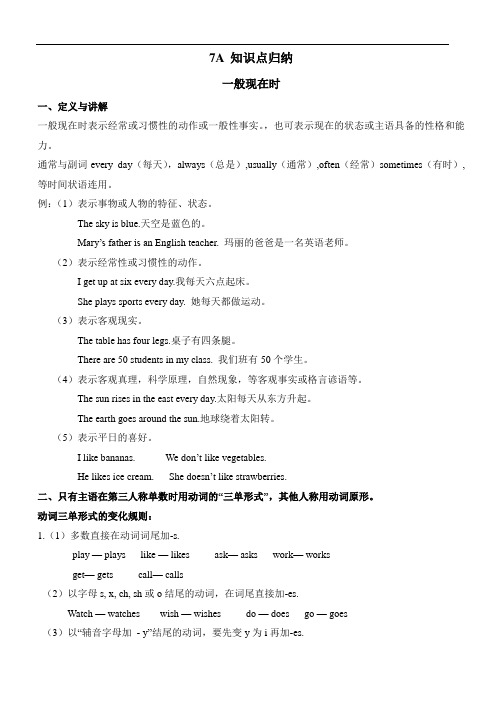
7A 知识点归纳一般现在时一、定义与讲解一般现在时表示经常或习惯性的动作或一般性事实。
,也可表示现在的状态或主语具备的性格和能力。
通常与副词every day(每天),always(总是),usually(通常),often(经常)sometimes(有时),等时间状语连用。
例:(1)表示事物或人物的特征、状态。
The sky is blue.天空是蓝色的。
Mary’s father is a n English teacher. 玛丽的爸爸是一名英语老师。
(2)表示经常性或习惯性的动作。
I get up at six every day.我每天六点起床。
She plays sports every day. 她每天都做运动。
(3)表示客观现实。
The table has four legs.桌子有四条腿。
There are 50 students in my class. 我们班有50个学生。
(4)表示客观真理,科学原理,自然现象,等客观事实或格言谚语等。
The sun rises in the east every day.太阳每天从东方升起。
The earth goes around the sun.地球绕着太阳转。
(5)表示平日的喜好。
I like bananas. We don’t like vegetables.He likes ice cream. She doesn’t like strawberries.二、只有主语在第三人称单数时用动词的“三单形式”,其他人称用动词原形。
动词三单形式的变化规则:1.(1)多数直接在动词词尾加-s.play — plays like — likes ask— asks work— worksget— gets call— calls(2)以字母s, x, ch, sh或o结尾的动词,在词尾直接加-es.Watch — watches wish — wishes do — does go — goes(3)以―辅音字母加- y‖结尾的动词,要先变y为i再加-es.try — tries study — studies cry — cries fly — flies2.不规则变化:be — is have — has三、一般现在时的句子转换:(1)变一般疑问句:当句子中有be动词或情态动词时,则把be动词或情态动词(can,could等)提到主语的前面,(口诀:一调二变三问号);(2)变否定句:在be动词或情态动词后面直接加not变成否定句. (be后not莫忘记)例:①陈述句:She is my sister..疑问句→ Is she your sister? Yes, I am./ No, I’m not.否定句→ She is not my sister.②陈述句:I can play soccer.疑问句→ Can you play soccer? Yes, Ican. / No, I can’t.否定句→ I can not /can’t play soccer.注意:对一般疑问句的回答:一般用什么问就用什么来回答。
牛津译林版七年级英语上册7AUnit2语法动动词一般现在时讲解

牛津译林版七年级英语上册7AU2 一般现在时一、一般现在时的意义(do型)一般现在时可以用来描述经常进行的动作、客观存在事实以及目前存在的事实(知觉、态度和感情)。
E.g. Millie gets up at 6:00 everyday. Cats eat fish. Daniel likes music.二、动词如何变三单。
1.通常直接加s e.g. like-likes, clean-cleans2.以s, x, ch, sh, o 结尾的单词,力[1 es e.g. watch-watches, wash-washes, dress-dresses3.以辅音+y 结尾的单词,变y 为i 加es e.g. study-studies, fly-flies4.have-has三、肯定句、否定句和疑问句。
1.肯定句l/We/You/They play football.He/She/lt plays football.2.否定句l/We/You/They do not play football.(do not二don't)He/She/lt does not play football.(does not二doesn't)3•—般疑问句(1)一-Do l/we/you/they play football?…Yes, l/we/you/they do. No, l/we/you/they do not.(2)…Does he/she/it play football?■一Yes, he/she/it does・No, he/she/it does not.四、易错点1.变句型+助动词do/does难题主要有(1 )句中实意动词为do,如lie always does homework carefiilly.其否宦句为He doesn't do homework carefully.(在该句中,do0S“t中的do是没有实际意义,不翻译出来,而do homework的do是做的意思,所以一句话中有两个do,不要把第二个省去了。
英语一般现在时全面讲解(附练习及答案)
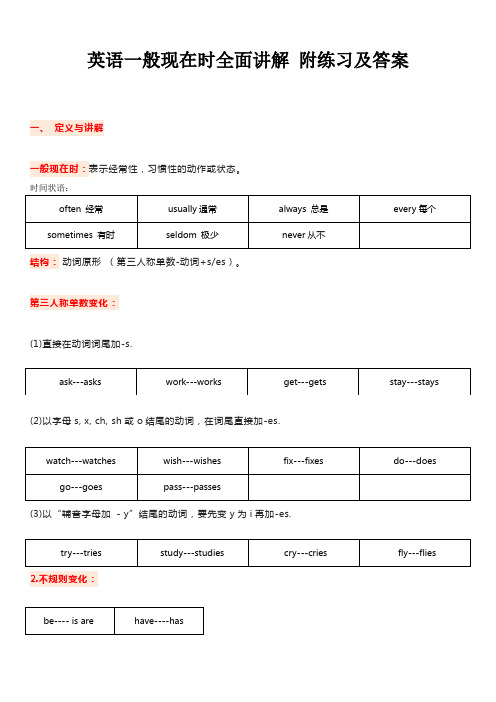
英语一般现在时全面讲解附练习及答案一、定义与讲解一般现在时:表示经常性,习惯性的动作或状态。
结构:动词原形(第三人称单数-动词+s/es)。
第三人称单数变化:(1)直接在动词词尾加-s.(2)以字母s, x, ch, sh或o结尾的动词,在词尾直接加-es.(3)以“辅音字母加- y”结尾的动词,要先变y为i再加-es.2.不规则变化:二、一般现在时用法1. 表示经常性,习惯性,永久性的动作或存在的状态.通常与副词sometimes, often, usually, always, every day (year, month ), once (twice, three times) a day,等时间状语连用。
2. 表示客观真理,科学原理,自然现象,等客观事实或格言,谚语等。
三、一般现在时的句子转换:(1)当句子中有be动词或情态动词时,则把be动词或情态动词(can,could等等)提到主语的前面变成疑问句;在be动词或情态动词后面加not变成否定句.(2)当句子中即没有be动词,也没有情态动词时,则在主语前加助动词do (you,以及复数), does(单数she,he,it)变成问句;在主语后谓语动词前加助动词don’t(I,you,以及复数), doesn’t(单数she,he,it)变成否定句,助动词后的动词要变成动词原形。
名师解析1.________ you often ________ tea?A.Do;drinks B.Does;drink C.Do;drink分析:你经常喝茶吗?根据often可知句子为一般现在时,主语为you,用助动词Do提问,动词用原形,C 符合题意,故选C。
2.My legs .A.hurt B.hurts C.hurting分析:我的腿……。
A痛,动词原形;B痛,动词单三形式,主语是名词复数,谓语动词用原形,排除;C痛,现在分词,用于现在进行时,构成be doing,缺少be,排除。
牛津译林英语七年级上册7A Unit2单元语法专练

C.sees D.looks
( A )5.—Do Kitty and Millie go to school on foot?
—
.They go to school by bus.
A.No,they don’t B.No,she doesn’t
C.Yes,they do D.Yes,they are
牛津译林英语七年级上册 Unit 2
单元语法专练
行为动词的一般现在时 行为动词的一般现在时可用于以下情况:表示习惯性的、经常性的动作;表示目前的爱好、 能力等;表示客观事实。 1.肯定句 ( 1 )根据不同的人称选择使用行为动词的不同形式。当主语是第三人称单数时,行为动词 用第三人称单数形式;当主语是第一、二人称和第三人称复数时,行为动词用原形。例如: I study at No.1 Middle School.But my friend studies at No.2 Middle School.我在第一中学学习。 但我的朋友在第二中学学习。
( 2 )行为动词一般现在时的第三人称单数构成规则。
一般现在时的肯定句中,主语为第三人称单数的动词变化主要体现在词尾的变化上,其构成规
则如下:
规则
原形 第三人称单数形式
一般情况下,直接在动词词尾加 s
get gets play plays
以 s,x,sh,ch,o 等结尾的动词,在词尾加 es
guess guesses teach teaches go goes
Ⅰ.单项填空
( B )1.—Do you have a pencil?
—
.It’s in my pencil box.
A.Yes,I can
B.Yes,I do
Unit2 行为动词的一般现在时 七上单元语法知识点与题型精练 含解析(新牛津译林版)
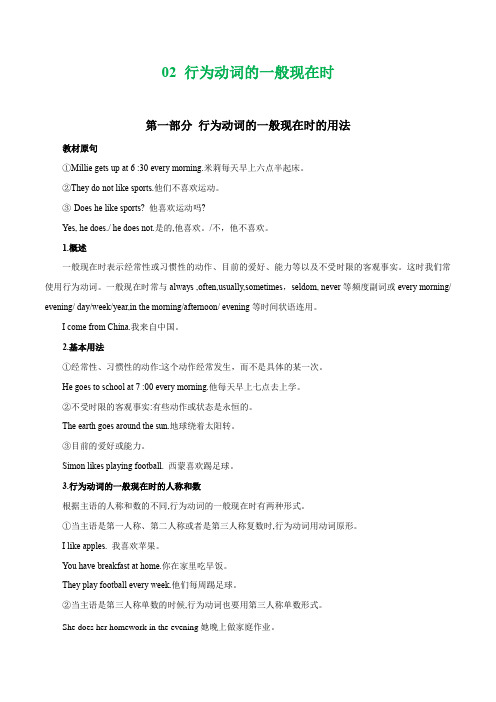
02 行为动词的一般现在时第一部分行为动词的一般现在时的用法教材原句①Millie gets up at 6 :30 every morning.米莉每天早上六点半起床。
②They do not like sports.他们不喜欢运动。
③-Does he like sports? 他喜欢运动吗?Yes, he does./ he does not.是的,他喜欢。
/不,他不喜欢。
1.概述一般现在时表示经常性或习惯性的动作、目前的爱好、能力等以及不受时限的客观事实。
这时我们常使用行为动词。
一般现在时常与always ,often,usually,sometimes,seldom, never等频度副词或every morning/ evening/ day/week/year,in the morning/afternoon/ evening等时间状语连用。
I come from China.我来自中国。
2.基本用法①经常性、习惯性的动作:这个动作经常发生,而不是具体的某一次。
He goes to school at 7 :00 every morning.他每天早上七点去上学。
②不受时限的客观事实:有些动作或状态是永恒的。
The earth goes around the sun.地球绕着太阳转。
③目前的爱好或能力。
Simon likes playing football. 西蒙喜欢踢足球。
3.行为动词的一般现在时的人称和数根据主语的人称和数的不同,行为动词的一般现在时有两种形式。
①当主语是第一人称、第二人称或者是第三人称复数时,行为动词用动词原形。
I like apples. 我喜欢苹果。
You have breakfast at home.你在家里吃早饭。
They play football every week.他们每周踢足球。
②当主语是第三人称单数的时候,行为动词也要用第三人称单数形式。
She does her homework in the evening她晚上做家庭作业。
牛津英语7A unit1-2一般现在时讲解和练习(含答案)

牛津英语7A unit1-2 语法--一般现在时一、一般现在时的定义1.表示事物或人物的特征、状态。
如:The sky is blue.天空是蓝色的。
2.表示经常性或习惯性的动作。
如:I get up at six every day.我每天六点起床。
3.表示客观现实。
如:The earth goes around the sun.地球绕着太阳转。
二、一般现在时的构成1. be动词:主语+be(am,is,are)+其它。
如:I am a boy.我是一个男孩。
2.行为动词:主语+行为动词(+其它)。
如:We study English.我们学习英语。
当主语为第三人称单数(he, she,it)时,要在动词后加"-s"或"-es"。
如:Mary likes Chinese.玛丽喜欢汉语。
三、一般现在时的变化1. be动词的变化。
1).否定句:主语+ be + not +其它。
如:He is not a worker.他不是工人。
2).一般疑问句:Be +主语+其它。
如:-Are you a student?-Yes. I am. / No, I'm not.3).特殊疑问句:疑问词+一般疑问句。
如:Where is my bike?2.行为动词的变化。
1).否定句:主语+ don't( doesn't ) +动词原形(+其它)。
如:I don't like bread.2).当主语为第三人称单数时,要用doesn't构成否定句。
如:He doesn't often play.3).一般疑问句:Do( Does ) +主语+动词原形+其它。
如:- Do you often play football? - Yes, I do. / No, I don't.4).当主语为第三人称单数时,要用does构成一般疑问句。
Unit 2【刷语法】行为动词的一般现在时(重点语法提升练)-2023-2024学年七年级英语上册单

2023-2024学年七年级英语上册单元模块满分必刷题(牛津译林版)Unit 2 Let’s play sports【刷语法】(重点语法提升练)行为动词的一般现在时一般现在时用法:(2)一般现在时的谓语结构:连系动词be的一般现在时:动词be的三变化am,is,are.我(I)用am ,你(you)用are ,is用于他(he)她(she)它(it),单数名词用is,复数名词都用are行为动词的一般现在时:行为动词的一般现在时的构成:主语+行为动词+(其他)当主语为第三人称单数(he, she, it,某一人或物)时,谓语动词也要用单数形式。
动词的三单形式的变化口诀:动词三单现在时,一般在词尾加SS, x, ch, sh,在词尾,直接加上-es词尾若是字母o ,加上-es 不用愁。
词尾是“辅音字母+y”,先变y为i,后边再加-es一、单项选择1.________ your grandmother ________ to bed early every day?A.Do, goes B.Do, go C.Does, goes D.Does, go 2.My father usually ________ home at 7 p.m.A.get B.will get C.gets D.got 3.—Look! It ________ outside.—Yes. It often ________ here in summer.A.rains; raining B.is raining; rains C.is raining; rain D.rains; raining 4.—How often ________ your father cook for you?—________.A.do, Two times B.does, NeverC.is, Once a week D.did, Seldom5.My brother usually ________ up late but tomorrow he ________ up early.A.gets; get B.get; will get C.gets; will get D.get; will gets 6.Now his father seldom ________ out for a walk after supper.A.go B.went C.goes D.gone7.She ________ every morning.A.exercise B.exercising C.exercises D.exercised 8.My best friend ________ a Smartwatch, but I ________.A.doesn’t have; do B.doesn’t have; have C.don’t have; do D.don’t have; have 9.—My friend Lisa often ________ me with my lessons.—________ kind she is! May I become her friend, too?A.help; How B.helps; How C.help; What D.helps; What10.—Do you have an ________ sister, Tony?—Yes, I do. And she often ________ a bike to the beach with me.A.older; ride B.older; rides C.elder, ride D.elder, rides11.On Saturdays Susan ________ some running and goes shopping with Mary.A.is doing B.will do C.does D.go12.—How does Lily go to school every day?—Lily ________ far from school. She goes to school by bus.A.lives B.is living C.live D.living13.My son is only 12 years old, but he is the tallest in our family. He ________ so fast.A.grows B.will grow C.grew D.has grown14.Every day I __________ sports with my parents to keep healthy.A.am doing B.do C.did D.will do15.—Where does your sister have lunch?—She usually _________ lunch at school.A.had B.has C.is having D.will have16.Lined with trees and flowers, the streets ________ our city more attractive than before.A.would make B.was making C.make D.made17.My brother often ________ to the water park to have fun in summer.A.go B.goes C.will go D.went18.Now my father ______ his bike to work every day instead of driving.A.rides B.is riding C.rode D.will ride19.—Tina, what do you usually do at weekends?—I usually ________ swimming with my parents.A.go B.goes C.going D.went20.It often ________ in summer. Don’t forget to take an umbrella with you.A.rain B.is raining C.rains D.will rain21.I always ________ volleyball with my classmates after school, but Gina always ________ TV at home.A.play; watchs B.plays; watchC.play; watches D.plays; watches22.Lisa always gets A in math. She ________ it well.A.don’t learn B.learns C.doesn’t learn D.learn23.Sam often ________ newspapers after supper. But today he is ________ a letter.A.reads; writing B.reads; writesC.is reading; writes D.is reading; writing24.—Can I help you, sir?—Yes. I bought this radio here yesterday, but it _______.A.works B.worked C.doesn’t work D.isn’t work 25.Mr. Black usually ________ TV at night. Now he ________ a basketball game on TV.A.watches; watching B.sees; seeingC.sees; is seeing D.watches; is watching26.Our English teacher always ________ us ________ try our best to realize the dream.A.encourage; to B.encourages; to C.encourage; with D.encourages; with 27.My father likes football but he ________ plays it. He only ________ football matches on TV!A.always; watch B.never; watches C.often; watched D.usually; will watch 28.—________? —She is of medium height.A.What does your cousin like?B.What did your cousin like?C.What does your cousin look like?D.What was your cousin like?29.The students will go to the Palace Museum if it ________ tomorrow.A.won’t rain B.isn’t raining C.doesn’t rain D.don’t rain 30.—We’ll go for a picnic if it ________ this Sunday.—Wish you a lovely weekend.A.rain B.doesn’t rain C.won’t rain D.rains31.Lily ________ about the question at the moment, and now she ________ it.A.is thinking, is understanding B.is thinking, understandsC.thinks, understands D.thinks, is understanding32.Her father is a teacher. He ________ in a high school.A.teach B.teachs C.teaches D.teaching 33.—What does David like?—He likes ________ basketball, so he often ________ it in the afternoon.A.to play; playing B.playing; to playC.playing; plays D.plays; to play34.—________ Jim ________ a new phone?—Yes. He likes it very much.A.Does; has B.Do; have C.Does; have D.Does; like 35.My sister ________ very well.A.sing B.sings C.singing D.to sing 36.—Hurry up. Look at the timetable. The last bus ________ at 11:30 p.m.—Don’t worry. We still have 10 minutes ________.A.leave; left B.left; leaves C.leaves; left D.will leave; leaves 37.The boy ________ his homework after school every day.A.do B.doing C.is doing D.does38.She is very rich and she ________ three houses.A.get B.have C.has D.had39.I have a soccer, but my friend ________.A.don’t B.does C.doesn’t D.do40.He ________ a sister, but he ________ a brother.A.has; don’t hasB.have; don’t haveC.has; doesn’t hasD.has; doesn’t have二、改写句子41.I like Mid-Autumn Festival.(把句子变成一般疑问句,并作肯定、否定回答)42.My daughter can dance. (把下列句子变成一般疑问句,并作肯定、否定回答)参考答案:1.D【详解】句意:你奶奶每天早睡吗?考查一般疑问句。
- 1、下载文档前请自行甄别文档内容的完整性,平台不提供额外的编辑、内容补充、找答案等附加服务。
- 2、"仅部分预览"的文档,不可在线预览部分如存在完整性等问题,可反馈申请退款(可完整预览的文档不适用该条件!)。
- 3、如文档侵犯您的权益,请联系客服反馈,我们会尽快为您处理(人工客服工作时间:9:00-18:30)。
行为动词的一般现在时态的学习一.行为动词:除be动词、情态动词、助动词以外的动词,也叫实义动词。
二.概念:一般现在时表示经常发生的动作或存在的状态。
三.常与always、often、usually、sometimes、every day、in the morning、on Sundays等时间状语连用。
如:We go to school every day.He often does his homework in the evening.China is a big country.四.用法:1)表示经常性的动作 2)表示客观真理、客观存在、科学事实 3)表示格言或警句4)表示现在时刻的状态、能力、性格、个性 5)在时间和条件状语从句中代表一般将来时。
五.构成:一般现在时主要用动词原形,如果主语是第三人称单数动词变三单,具体规则如下:三人称单数时,助动词用does。
在非正式行文中,do not 和does not 可以缩写成don’t 和doesn’t.如:Students do not go to school on Sunday. 学生周日不上学。
He does not work in this shop. 他不在这家商店工作。
行为动词一般现在时的疑问句式是在句首添加助动词do或does,当主语是第三人称单数时,助动词用does.如:-Do you play basketball after class? 你放学后打篮球吗?-Yes, I do. 是的,我打篮球。
-Does John speak Chinese? 约翰说中文吗?-No, he doesn’t. 不,他不说中文。
注意:在疑问句和否定句中,助动词之后的行为动词均用原形。
区分行为动词do和助动词do的用法。
如:I do not do housework on Saturday. 我周六不做家务。
Do you do housework on Saturday? 你周六不做家务吗?(第一个do是助动词,第二个do是行为动词)七.句型转换:1.否定句:在行为动词的前面加don’t或doesn’t(does not),注意谓语动词要还原为动词原形。
( 1 )I play basketball on Wednesday..I don’t play basketball on Wednesday.( 2 )Lily has breakfast every day.Lily doesn’t have breakfast every day.2.一般疑问句:在句首加助动词do或does,后面的谓语动词还原为动词原形.3.肯定与否定回答:Yes, 主+ do/does./ No, 主+ do/doesn’t.Does he have breakfast every day ?Yes, he does./ No, he doesn’t.练习:一、写出下列动词的第三人称单数1、clean_____2、read_____3、make ___4、look ____5、play___6、pass____7、wash____8、fix_______9、watch_____10、do_______11、fly ________12.study_______二、写出下列动词的正确形式:1、I (go) to school at seven in the morning.2. Mike( do) his homework at eight in the evening.3. His father often ( read) books in the library on Saturday.4.My mother usually(watch) TV plays at home.5. My cousin sometimes (play ) cards with me.6. you often(study ) after school ?Yes , I do.7. Mike and Tom usually (fly ) kites on Sunday.8. They(go) to school by bus every day.9. She (go ) to school by bus every day.10.We usually (listen ) to the radio in the morning.11. He usually (listen ) to the radio in the morning.12. he usually(listen ) to the music at home?---No, he .三、用括号内动词适当的形式填空1.We often_________(play) in the playground.2.He often________ (get) up at six o’clock.3._____you___ (brush) your teeth every morning.4. What___(do) he usually____(do) after school?5. ________ they ____________(like) the World Cup?6.Mike sometimes __________(go) to the park with his sister.7.At eight at night, she_ (watch) TV with his parents.8_____ Mike_____ (read) English every day?9.How many lessons_your classmate________(have) on Monday?10.What time_his mother(do) the housework?11. He often ________(have) dinner at home.12. Daniel and Tommy _______(be) in Class One.. 1313. We _______(not watch) TV on Monday.14. Nick _______(not go) to the zoo on Sunday.15. ______ they ________(like) the World Cup?四、句型转换。
1.Do you often play football after school? (肯定回答)2.I have many books. (改为否定句)3.She lives in a small town near New York.(改为一般疑问句)练习二:一、单项选择( ) 1. There __________ a meeting tomorrow afternoon.A. will be going toB. will going to beC. is going to beD. will go to be( ) 2. Charlie ________ here next month.A. isn't workingB. doesn't workingC. isn't going to workingD. won't work( ) 3. He ________ very busy this week, he ________ free next week.A. will be; isB. is; isC. will be; will beD. is; will be( ) 4. There ________ a dolphin show in the zoo tomorrow evening.A. wasB. is going to haveC. will haveD. is going to be( ) 5. -_____ you ______ free tomorrow? - No. I _____ free the day after tomorrow.A. Are; going to; willB. Are; going to be; willC. Are; going to; will beD. Are; going to be; will be( ) 6. Mother ________ me a nice present on my next birthday.A. will givesB. will giveC. givesD. give( ) 7. - Shall I buy a cup of tea for you? -________. (不,不要。
)A. No, you won't.B. No, you aren't.C. No, please don't.D. No, please.( ) 8. - Where is the morning paper? - I ________ if for you at once.A. getB. am gettingC. to getD. will get( ) 9. ________ a concert next Saturday? A. There will be B. Will there be C. There can be D. There are( ) 10. If they come, we ________ a meeting. A. have B. will have C. had D. would have( ) 11. He ________ her a beautiful hat on her next birthday.A. givesB. gaveC. will givingD. is going to give( ) 12. He ________ to us as soon as he gets there. A. writes B. has written C. will write D. wrote( ) 13. He ________ in three days. A. coming back B. came back C. will come back D. is going to coming back( ) 14. If it ________ tomorrow, we'll go roller-skating.A. isn't rainB. won't rainC. doesn't rainD. doesn't fine( ) 15. - Will his parents go to see the Terra Cotta Warriors tomorrow?- No, ________ (不去).A. they willn't.B. they won't.C. they aren't.D. they don't.( ) 16. Who ________ we ________ swimming with tomorrow afternoon?A. will; goB. do; goC. will; goingD. shall; go( ) 17. We ________ the work this way next time.A. doB. will doC. going to doD. will doing( ) 18. Tomorrow he ___ a kite in the open air first, and then ____ boating in the park.A. will fly; will goB. will fly; goesC. is going to fly; will goesD. flies; will go( ) 19. The day after tomorrow they ________ a volleyball match.A. will watchingB. watchesC. is watchingD.are going to watch( ) 20. There ________ a birthday party this Sunday.A. shall beB. will beC. shall going to beD. will going to be( ) 21. They ________ an English evening next Sunday.A. are havingB. are going to haveC. will havingD. is going to have( ) 22. ___ you ____ free next Sunday? A. Will; are B. Will; be C. Do; be D. Are; be( ) 23. He ______ there at ten tomorrow morning. A. will B. is C. will be D. be( ) 24. ________ your brother ________ a magazine from the library?A. Are; going to borrowB. Is; going to borrowC. Will; borrowsD. Are; going to borrows( ) 25. - Shall I come again tomorrow afternoon? -________ (好的).A. Yes, pleaseB. Yes, you will.C. No, please.D. No, you won't.( ) 26. It ________ the year of the horse next year. A. is going to be B. is going to C. will be D. will is( ) 27. ________ open the window? A. Will you please B. Please will you C. You please D. Do you( ) 28. - Let's go out to play football, shall we? - OK. I ________.A. will comingB. be going to comeC. comeD. am coming( ) 29. It ________ us a long time to learn English well.A. takesB. will takeC. spendsD. will spend( ) 30. The train ________ at 11. A. going to arrive B. will be arrive C. is going to D. is arriving二、动词填空1. I ______________(leave)in a minute. I ____________(finish)all my work beforeI ______ (leave).2. -How long ___________ you _____(study)in our country?3. I ______(be)tired. I ____________(go)to bed early tonight.4. Mary's birthday is next Monday, her mother ___________(give)her a present.5. It is very cold these days. It ____________(snow)soon.6. _____ you _____(be)here this Saturday?-No. I ____________(visit)my teacher.7. ______ I ______(get)you a copy of today's newspaper?-Thank you.8. I am afraid there ____________(be)a meeting this afternoon. I can't join you.9. Mike ____________(believe, not)this until he ______(see)it with his own eyes.10. Most of us don't think their team ____________(win).11、I _____(plan)to be here for about one more year.12、I _____(hope)to visit the other parts of your country.13、What ______ you ______(do)after you ______(leave)here?14、I ____________(return)home and ______(get)a job.练习三:1、Both his parents look sad .Maybe they _________what's happened to him .A. knew B. have known C. must know D.will know2、He has _______ been to Shanghai , has he ?A. already B.never C.ever D. still3、Have you met Mr Li ______?A. just B. ago C.before D. a moment ago4、The famous writer _____ one new book in the past two yearA. is writing B.was writing C.wrote D.has written5、-Our country ______ a lot so far .-Yes . I hope it will be even ______ .A. has changed ; well B. changed ; goodC. has changed ; better D. changed ; better6、Zhao Lan ______already ______in this school for two years .A. was ; studying B. will ; studyC. has ; studied D. are ; studying7、We ______ Xiao Li since she was a little girl .A. know B. had known C. have known D. knew8、Harry Potter is a very nice film . I_______ it twice .A. will see B. have seen C. saw D.see9、-These farmers have been to the United States .-Really ? When _____ there ?A. will they go B. did they goC. do they go D. have they gone10、-______ you ___ your homework yet ?-Yes . I _____ it a moment ago .A. Did ; do ; finished B. Have ; done ; finishedC. Have ; done ; have finished D. will ; do ; finish11、His father ______ the Party since 1978 .A. joined B. has joined C. was in D. has been in12、-Do you know him well ?- Sure .We _________ friends since ten years ago .A. were B. have been C. have become D. have made13、-How long have you ____ here ?- For about two months .A. been B. gone C. come D. arrived14、Hurry up! The play __________ for ten minutes .A. has begun B. had begun C. has been onD. began15、It _____ ten years since he left the army .A. is B. has C. will D. was16、Miss Green isn't in the office . she_______ to the library .A.has gone B. went C.will go D. has been17、My parents ______ Shandong for ten years .A. have been in B. have been toC. have gone toD. have been18、The students have cleaned the classroom, ________ ?A. so theyB. don't theyC. have theyD. haven't they19、________ has Mr White been a member of Greener China since he______ to China?A. How soon, comesB. How often, gotC. How long, cameD. How far, arrived20、His uncle ________for more than 9 years.A. has come hereB. has started to workC. has lived thereD. has left the university答案练习二:一、1. C 2. D 3. D 4. D 5. D 6. B 7. C 8. D 9. B 10. B 11. D 12. C 13. C 14. C 15. B 16. D 17. B 18. A 19. D 20. B 21. B 22. B 23. C 24. B 25. A 26. A 27. A 28. D 29. B 30. D二、1. am leaving ; will finish ; leave 2. will ; study ; 3. am ; will go 4. will give 5. will snow 6. Will, be ; will visit 7. Shall ; get8. will be 9. won't believe ; sees 10. will win 11. plan ;12. hope ;13. will ; do ; leave ; 14.will return ; get练习三单选:1、B2、B3、C4、D5、C6、C7、C8、B 9、B10、B11、D12、B 13、A 14、C 15、A16 A17、A 18、D 19、C 20、C。
